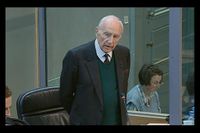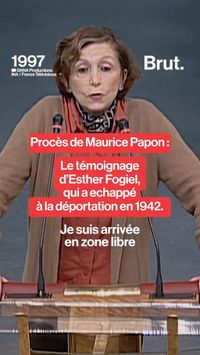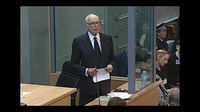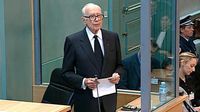On April 16, 2025, the documentary "Le Procès de Maurice Papon" is set to air on France 3, recounting the complex trial of Maurice Papon, a high-ranking official accused of facilitating the deportation of 1,690 Jews, including over 200 children, during World War II. This trial, which took place from October 1997 to April 1998 at the Gironde Assize Court, serves as a stark reminder of France's dark past and the role of its administration in the Holocaust.
Papon, who was the head of the Jewish Affairs department in Gironde between 1942 and 1944, faced serious allegations of complicity in crimes against humanity. His actions during this period included overseeing the arrest and deportation of Jews, culminating in their transportation to Drancy and then to Auschwitz. The documentary, directed by Gabriel Le Bomin, aims to shed light on the moral complexities surrounding Papon's actions and the broader implications of collaboration with the Nazi regime.
During the trial, Papon, then 87 years old, maintained his innocence, asserting that he was merely following orders and that he did not know the ultimate fate of those he helped deport. This defense was met with skepticism, as many witnesses, including legal representatives for the victims, argued that his bureaucratic decisions had dire consequences. "What is reproached to Maurice Papon is a crime of paperwork. He was a man who, in his office at the prefecture, stamped decisions that would have dramatic consequences," stated judicial journalist Dominique Verdeilhan in the documentary.
The trial was marked by intense scrutiny of Papon's role in the infamous Vel' d'Hiv roundup, which occurred on July 16, 1942, when thousands of Jews were arrested across France. In Gironde, the percentage of Jews arrested that night was particularly high, with 70% of the Jewish population being taken into custody, far exceeding the national average of 40% from the Vel' d'Hiv roundup. This stark statistic highlights the severity of Papon's actions and the complicity of local authorities in the Nazi's genocidal plans.
As the trial unfolded, Papon's defense relied heavily on the argument that he was simply a cog in the machine of a larger, oppressive regime. However, this claim did little to absolve him of responsibility. The documentary illustrates the tension between individual accountability and systemic complicity, a theme that resonates deeply in discussions of historical injustices. "He was capable of denying the most obvious things until he could no longer do so, and at that moment, he would adapt a little," remarked Pierre Mairat, an attorney for the civil parties, reflecting on Papon's evasive tactics during the trial.
One of the most chilling aspects of the trial was the testimony of Thérèse Stopnicki, whose two young sisters, Rachel and Nelly, were deported in August 1942. Stopnicki's emotional account of her sisters' fate starkly contradicted Papon's claims of ignorance. "A lady who had the girls in her care testified that the Stopnicki children were claimed by their parents. Why pin this infamy on me?" Papon had insisted during a televised interview prior to the trial, highlighting his attempts to deflect blame. However, Stopnicki's testimony revealed the painful truth of the situation, as she recounted meeting the woman who had cared for her sisters, who had never claimed that their parents wished to retrieve them.
The proceedings lasted six months, with jurors deliberating for nineteen hours over 764 questions related to the charges against Papon. Ultimately, he was convicted of complicity in crimes against humanity and sentenced to ten years in prison, of which he served three years before being placed under house arrest until his death in 2007. The trial not only sought to hold Papon accountable but also aimed to confront France's collective memory of the Holocaust and the role played by its officials during the Nazi occupation.
As the documentary airs, it serves as a poignant reminder of the necessity of confronting historical wrongs and the importance of accountability in the face of systemic injustice. The legacy of Maurice Papon, who has often been described as a "man without blood on his hands but with much on his conscience," continues to provoke discussions about the nature of complicity and moral responsibility.
Judge Jean-Louis Castagnède, who presided over the trial, passed away on the same day as Papon, marking a somber end to a chapter in French legal history that grappled with the complexities of justice and memory. The airing of "Le Procès de Maurice Papon" on France 3 is not only a reflection on one man's trial but also an exploration of France's ongoing struggle to reckon with its past.
In a country still navigating the ramifications of its wartime actions, the documentary highlights the critical need for remembrance and the pursuit of justice, ensuring that the voices of those who suffered are not forgotten. As viewers tune in, they are invited to reflect on the implications of Papon's actions and the broader societal responsibilities that arise in the face of tyranny.









